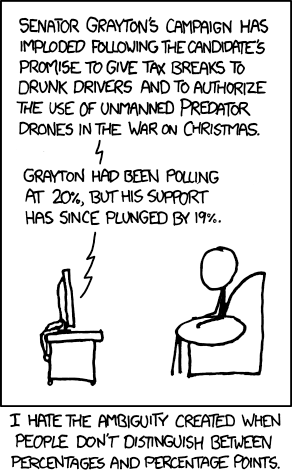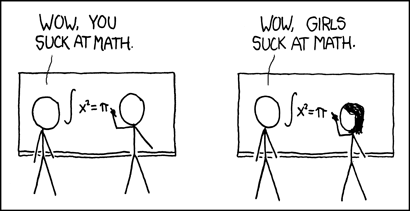Can’t believe nobody has linked the relevant xkcd yet

We appreciate your service.
🫡
🫡
Which of course is why people referred to points when discussing stocks/markets. Got to love an unambiguous term.
Having two possible outcomes does not mean it’s a 50:50 chance.
“So if I aim the arrow at the 1cm square from 100m away and shoot, I either hit it or I don’t. So basically I have a 50% chance of hitting it.”
My wife, father-in-law and I were playing a board game with my brother-in-law. In this game, we were playing as detectives who have to try to find his character, but each turn he could move in secret in one of several directions. We were a few turns in at one point and he could have been in any of dozens of places at this point. We drove him nuts by saying “he’s either in this spot or he’s not, it’s a 50-50 chance.” He kept arguing “I could be in a ton of places! It’s not a 50-50 chance!” But we just kept pretending we didn’t understand and arguing that there were only two possibilities, he’s there or he’s not, so it was clearly a 50-50 chance. He got quite angry.
Scotland Yard or Letters from Whitechapel?
I love Scotland Yard. We got it for a friend who loves detective stories. Then discovered that it’s a public transit simulator which is even better.
Honestly, Letters From Whitechapel is a better design of the same concept.
For detective story games, Sherlock Holmes Consulting Detective is amazing.
And for public transit games, Bus is the way to go (probably)
We bought it at goodwill on a whim knowing nothing about it. Good to know about your other suggestions. Thanks!
Public transit simulator! No way
Letters from Whitechapel
Letters from Whitechapel?
Either that or you buried the lede by failing to mention something rather significant about the hidden character, and you were playing Fury of Dracula. Or my boardgamegeek-fu isn’t as strong as I hoped.
Yeah it was Letters from Whitechapel.
you know, if you watched for tells, that could tilt the probabilities… and I bet with the frustration… he was flashing tells all over the place…
deleted by creator
You’ve already failed.
You have to commit hundreds of felonies. In broad daylight. And brag about it.
Threaten witnesses. Delay everything.
And only be convicted of 34.
Then not get sentenced.
Very weird fun fact about arrows/darts and statistics, theres 0% chance of hitting an exact bullseye. You can hit it its possible to throw a perfect bullseye. It just has a probability of zero when mathematically analyzed due to being an infinitesimally small point. Sound like I’m making shit up? Here’s the sauce
How can an outcome both be entirely possible and have 0% probability?

Q.E.D
Key word here is “infinitesimally.” Of course if you’re calculating the odds of hitting something infinitesimally small you’re going to get 0. That’s just the nature of infinities. It is impossible to hit an infinitesimally small point, but that’s not what a human considers to be a “perfect bullseye.” There’s no paradox here.
Another lesson I the importance of significant digits, a concept I’ve had to remind many a young (and sometimes an old) engineer about. An interesting idea along similar lines is that 2 + 2 can equal 5 for significantly large values of 2.
What do you mean by significantly large
Depending on how you’re rounding, I assume. Standard rounding to whole digits states that 2.4 will round to 2 but 4.8 will round to 5. So 2.4+2.4=4.8 can be reasonably simplified to 2+2=5.
This is part of why it’s important to know what your significant digits are, because in this case the tenths digit is a bit load bearing. But, as an example, 2.43 the 3 in the hundredths digit has no bearing on our result and can be rounded or truncated.
Also the circumference of the dart tip is not infinitesimally small, so theres a definite chance of it overlapping the ‘perfect bullseye’ by hitting any number of nearby points.
Oh. That’s what they mean. That’s dumb lol.
You must not be playing on a soft tip board.

On the other hand: Half of my lottery tickets were jackpots. I never played and have (1/2 * 0 = ) 0 jackpots.
The thing with that is that it’s actually a useful generalization to make in a lot of scenarios.
If you know nothing about the distinction between two possible outcomes, treating them as equally likely is a helpful tool to continue with the back of the envelope guess. Knowing this path needs 5 coin tosses to go right and this one needs 10 is helpful to approximate which is better.
Your example is obviously outside the realm where you have zero information, so uniform distribution is no longer the reasonable default. But the idea is from a reasonable technique, taken to extremes by someone who doesn’t fully get it.
That’s not even a stat question, it is a english question. It is an increase by 80% not to 80%
Statistics only come to play to figure out our new chances.Maybe I’m wrong but by writing “increase by 80%” there is ambiguity you don’t get if you instead spelled out:
- Increase by 80 percent
- Increase by 80 percentage points
I’m not an expert either and your second option is definitly clearer than mine but I believe the % symbol doesn’t have the meaning of percentage point.
It is better to make things easier for people to understand but people should also make the effort of properly reading even when it is not fully dumbed down. These are prepositions, so basic english not scientist jargon.
Im a high school maths teacher and that’s what we’re supposed to teach, % means percent, not percentage points. Maths always tries to have agreed-upon unambiguous definitions of things, precisely to avoid confusion.
Maths always tries to have agreed-upon unambiguous definitions of things, precisely to avoid confusion.
Laughs in ambiguous notation
I thought of an example or two and corrected my comment to ‘tries to’ as I was typing haha
Or “by 80 percentage points”
“By 80 percentage points” means add 80 more points to a number of percentage points, so 5% becomes 85%. “By 80 percent” means add 80 percent of the current value.
I know. By x % and by x percentage points is the most commonly confused pair, not by x % and to x %.
In game design, it has to be stated whether it’s multiplicative or additive. Sometimes a logarithmic function is used as well, with increases in efficiency as 1 / ( 1 + bonus ). This allows you to always add more bonus, but there’s diminishing returns.
i wish it was more common to also indicate the precedence of a percentage increase, so that it’s easier to know if i’m dealing with (x + y ) * z or x + (y * z). although that’s admittedly a lot harder to communicate.
Just include a glossary of formulas for figuring out stats/chances/whatever in your game. With clearly labeled variables. Then throw a reference to that glossary in your tooltips/helpful popups.
Wouldn’t it be easier for everyone to instead not add such systems? After all, don’t many go for the simple logic of bigger number is better instead of doing the math?
This upgrade adds +100% critical chance.
The weapon has a base critical chance of 10%, so the new critical chance is 20%, not 110%
In game design +100% would be 10% + 100% = 110% crit.
Increases by +100% = base + 100%
Increases by 100% = base + base x 100%
When my son was about to be born my mother in law caught wind that we didn’t plan on circumcising (before researching it I mostly felt it was just strange to do cosmetic surgery on a newborn) but her argument was mostly parroting the 50% reduction in this that and the other disease, missing the fact that it was going from a 0.5% chance to a 0.25% chance, but of course introduced new risks by nature of being a surgery.
Naturally after looking more into it I learned just how bonkers circumcision is so I was far more cemented in my position
Funny thing is this is a language issue, not a math issue.
It’s really pretty simple - if something increases by 80%, you add 80% of whatever it already is… one dollar becomes $1.80… one percent becomes 1.8 percent.
Most people don’t understand it because they’ve seen it done wrong so often, the wrong way seems right.
I’m quite willing to bet that 70% of the population has no clue that percentages, fractions, and decimals are the same thing.
That’s about 60% more than expected
You mean 38 percent points higher ?
Then odds show up to the party and upend everything we thought we understood.
I think you can increase that by about 7.5/10%
Is that 7.5 percent or 7.5 percentage points though? :/
11%/10% with rice
I work in a place full of statisticians, and we’ve had to unfortunately have numerous conversations with some of them about the difference between “a decrease” and “a decrease in the rate.” Apparently “it’s increasing slower” isn’t clear enough for some.
Maybe I’m understanding wrong but a decrease in the rate would be the derivative of a decrease. Aka the slope of the line. So if you are decreasing at -x. Rate of decrease is -1.
Unless I follow your wording incorrectly. Obviously it isn’t always so nice of a function in real stats. Is that what they are missing?
I think it’s more y=5x and then y=3x, so you’re still increasing, but the rate of increase has decreased. Versus y=-x where the function is now decreasing.
This is exactly the issue that happens. They write things out narratively like a decrease happened, which would cause some panic in certain groups we work with, and then they would argue when we requested they fix it to represent a decrease in the rate of increase, or a slower/lower increase than prior, or however they wanna say it. But it certainly didn’t decrease.
So the derivative of the derivative, lol. It goes all the way down in math, physics though, that guys a jerk. (Sorry for the bad joke)
well it’s ambiguous. Its also a sloppy way of expressing an increase by 80 percentage points.
That’s not sloppy, that’s simply wrong
Fair enough, I’m inclined to agree. It’s a relatively common error though, still leaving it ambiguous outside of circles where you expect people to express themselves with mathematical precision.
I’ve always wondered how to disambiguate multiplication and addition of percentages. I guess that’s what percentage points are for?
10% of your people vote for a party.
The votes increase by 10% => now 11%
The votes increase by 200% => now 30%
The votes increased by 50 percent points => now 60%
The annoying part is that there is no well-known notation for showing percentage points, so people use % for both percentages and percentage points.
In deep rock galactic survival, the color of the number is different for percentage and percentage points
We really should just have a different symbol tho. Maybe we do, I’m not a math wiz, but we certainly don’t have a broadly used one.
I’d love to see percentage points as a symbol that’s literally “%” with dots in the circles
I like how some games use “increases by +10%” as percentage points and “increases by 10%” as percentage.
Or how oath of exile does it, with “(base + base * increases by y%) * z% more”
So with a base of 5%, chance increased by 20%, and chance increased by 30%, with a 40% more chance, you’d get:
(5% + 5% x (20% + 30%)) x (1+40%) = 7.5% x 1.4 = 10.5%
Exactly. Unfortunately, they aren’t used widely and consistently enough. Even in the press. So you frequently have to second guess what you’re reading.
Wrong: I had a 1% chance, and I doubled my chances. Now my chances are 101%.
Right: I had a 1% chance, and I doubled my chances. Now my chances are 2%.
Wrighongt: I had a 1% chance, and I doubled my chances. Now my chances are 3%, because I’m a lucky person.
Sleep deprived fraction lover: I had a 1% chance, and I doubled my chances. Now due to 1/100 * 1/100 I chances are 0.0001%.
So you’re telling me there’s a chance?
People got this wrong about inflation as well. In 2020 there was actual deflation, and in 2021 there was very minimal inflation, meaning prices were still largely lower or similar as 2019. Then we saw 9% inflation in 2022. Total inflation in 2024 vs the 2019 benchmark was around 15%. Or 3% average per year, which is barely over the baseline. People just hear 9% inflation, completely missing the fact that this was a YoY number relative to the Trump recession.
And then there was that bogus article that said Argentina had lowered it’s inflation to 2% and you find out in the article that’s monthly inflation and the yearly figure was like 190%.
If they managed to decrease from 190%/year to 2%/month (which is 27%/year) that’s still an impressive result. Not as impressive to publish when you want to make a click bait.
I’m not sure how to put that to percentages thought, is it 86% and 143 percent points decrease?
Drag doesn’t know exactly what the problem is, but the official inflation figures cannot be right. Housing is so much more expensive. Food is more expensive. And it’s not 9% more expensive. Drag knows they say the math takes into account the price of rent, but they’ve gotta be lying somehow. It’s impossible that the cost of living is rising so much faster than inflation. Those should be the same. If they’re not the same, someone’s math is wrong.
I keep track of my grocery bills going on 10 years now and 14-15% is spot on for what I buy.
Housing is more than 15% more expensive
It may as well be accounted in the inflation, but with a lower weight. Usually the institution responsible for calculation of the inflation will publish the methodology so one can see for emselve, real perceived inflation may be higher or even lower depending on what your consumption profile is.
Won’t your consumption profile necessarily change if rent is raised and you have to buy fewer luxuries? Do the calculations take that into account?
Ever seen girl math?
“If I preload my Starbucks account with $25 and I go to Starbucks the following week, my order was free.”
“Spending money abroad doesn’t count because it’s a different currency.”
Things aren’t mathing as they should.
What makes this “girl” math?

Sexism 👉👉
Anecdotally, I’ve only heard women use that sort of argument IRL. Kinda falls in the, “This widget is 80% so I’m saving money!”
Well, no, not if you didn’t have to purchase the widget in the first place.
Men are hardly immune, but in my experience it’s more so women.
As I recently learned,
“If I return clothes to the store (store credit), but then buy new clothes (using that store credit), those new clothes are free. (No new money spent)”
They aren’t free but they are a sunk cost so you might as well
That’s why when presenting numbers at work, we always distinguish a movement of X % (percent) from a movement of X ppts (percentage points)


















